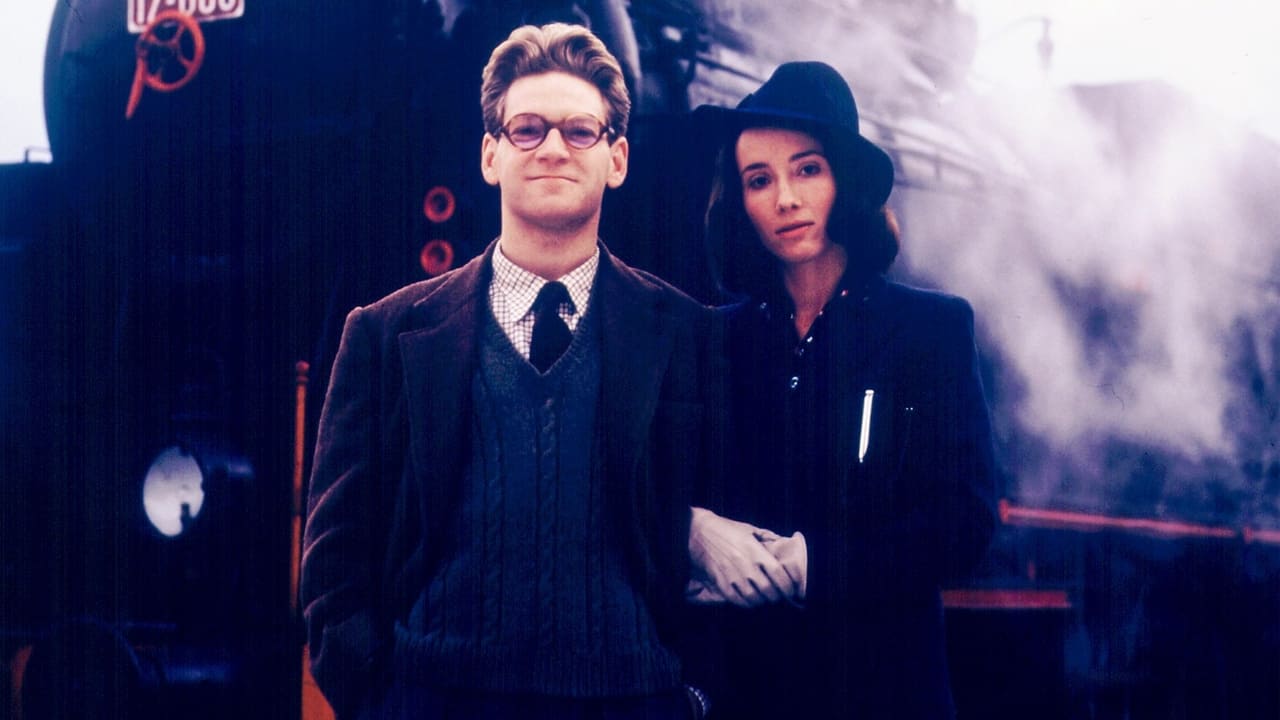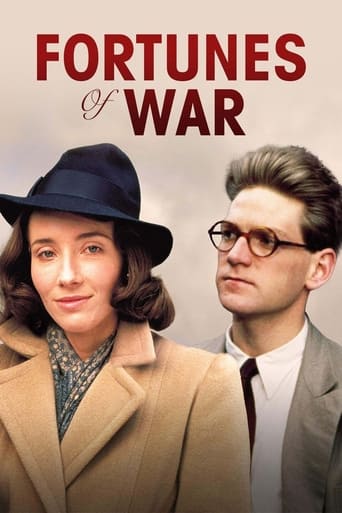

The greatest movie ever!
... View MoreIt is a performances centric movie
... View MoreA clunky actioner with a handful of cool moments.
... View MoreAmazing worth wacthing. So good. Biased but well made with many good points.
... View MoreIt is always difficult to judge a movie based upon a book without passing judgment on what it manages to retain and what it (un)intentionally leaves behind. Olivia Manning's books used to be banned in Romania during the communist régime, and that is probably the reason why this TV series has been shot in some locations in Yugoslavia at the time of its production (1986 - 1987). I find the acting excellent, and the atmosphere filled with nostalgia. Nevertheless, given the fact that the producers have included various black-and-white excerpts from WWII documentaries, I find it inexcusable that they haven't also included vintage images of Bucharest in the 1940's, and especially of the Athénée Palace Hotel. Using some lugubrious Ljubliana building as a stand-in is very hard to swallow, especially for someone very well acquainted with the splendours of interbellum Bucharest. The same could have been done about the Royal Palace. And this would have hardly increased the costs. Apart from that, I find this worth watching and re-watching. As one grows older, one sees things differently.
... View MoreDiscerning Northern Irish actor Kenneth Branagh and the beautiful, brilliant Emma Thompson met and presumably fell in love here, as they play bohemian British newlyweds Guy and Harriet Pringle who arrive in Bucharest, as does the slothful, flat broke Prince Yakimov, who takes up an ad hoc job as a photojournalist of sorts on a British paper to save himself from total indigence. Harriet is introduced to her fellow expatriates, but their happy life is disjoined by the assassination of Romania's prime minister and Nazi Germany's invasion of Poland. Gossip murmurs of a German invasion of Romania and Guy, mentally consumed all the same in his work and arranging civil occasions, is gaulled by his Communism (no pun intended) to take peripheral measures to take care of the family of a Jewish student of his from the anti-Semitic Romanian regime. Although this premise sounds as if it gains momentum and grows more and more exciting, it decidedly does not.Almost reminiscent of the Jean Renoir film Grand Illusion, Fortunes of War shows a group of people segueing through meetings with different cultures, a war raging on around them but not bothering them any more than some other long-term struggle. But unlike Grand Illusion, the conflicts between the characters are unrelated to the war. It is only one of the dominoes that instigates the many things they do, mainly because they, calm and collected, take refuge in their culture, which remains impervious to the effects all the other ones seem to try to impose upon them through each of these seven one-hour episodes. We watch Guy's lofty devotion to make a difference and boost morale from within. Histrionics mature, decelerate or sustain between the couple and those who come and go from their lives, and we start to care about most of them. With this apposing of following the Pringles subjectively and impartially observing their affiliates, we see how fearful daily life could be with the consistent foreboding of war, but how it isn't. We contemplate Guy with his wife as he preoccupies himself with good intentions towards so many, yet at her exasperated cost, and we want to rattle him out of his cerebrum for a breather in her heart.In seven hours, the story goes through no significant mood swings, nor any real climax, even in the final episode. But that's just how all of its characters feel about it. Life just goes on, and on and on. Characters latch on, decisions are made, people come and go. My favorite part is when Pinkrose finally gets to give his lecture on Lord Byron.
... View MoreThe three points are for the splendid production values. I have not read the novels but offer this point of view based solely on the TV series. Well acted by all means, but Fortunes of War is ultimately tedious and horrendously disjointed. It is like watching a Play for Today that goes on and on and on. While Plater's terse and character-obsessed style no doubt works for short TV drama and the stage, it is out of place in a lavish and lengthy production such as this. In the end there was no plot to speak of. I kept waiting for something to happen, but it never did. I kept waiting for some drama, some explosion of conflict between the seemingly endless numbers of characters but again there was nothing. Yes, we had a snapshot of Europe on the brink of war, of the British ex-pat community at play, desperately trying to ignore the gathering storm and looking to their own self interest. But so what? This theme has been done to death. The characters were quirky in some cases (and then only in an irritating way) but mostly they were extremely dull. I was unable to care about any of them. We are told that the story is about the break up of the Pringle marriage as it faces the stresses and strains of impending war. But the impending war never seemed to really threaten and the British ex-pats seemed almost unconcerned about it. The Thompson- Branagh relationship- if relationship is the right word- lacked any passion and from the start they seemed to be two dull people ideally suited to each other. There was never ever a 'relationship' to break up and so when it 'started' I really didn't feel anything at all. Branagh's character was the most disappointing, almost soporifically so. We are told he was a communist, feverishly against war, yet he expresses little outrage at the collapse of civilization (apart from the odd and very unconvincing 'war is an outrage' uttered over yet another glass of wine). Not such an outrage that it should interrupt his frankly absurd obsession with Shakespeare et al at a time when everything Shakespeare stood for was crashing down on his head. All the characters seemed to be thoroughly amoral. The only one I frankly cared for was the old man and the toy dog he dragged around. In the end that summed up this failed production for me. Nothing but a drag.
... View MoreA big novel's length is always a challenge to a film adaptation of the work. When six novels are involved, as is the case here (from Olivia Manning's The Balkan Trilogy and The Levant Trilogy), the task of adapting the work means most of it gets left behind. How to produce a script that retains some of the novel's uniqueness and flavor but is still coherent to viewers unfamiliar with the novel? Various solutions come to mind. For example, Volker Schlöndorff wisely bit off only the first third of Günter Grass's masterpiece, The Tin Drum, and created a film that at times exceeds its source material in power and impact. And against all odds, the young Ray Bradbury managed to extract key scenes and language from Moby Dick to come up with a script which, when coupled with a decent director (John Huston) and good casting choices (I'm thinking here of Orson Welles as Father Mapple), made a pretty decent movie.Sadly, with Fortunes of War, casting works against the film. Where Guy Pringle is a big bear of a man in the novels, Branagh's sensitive Guy just isn't the same character. And where Harriet Pringle is a small and at times frail woman in the novels, Thompson's Harriet is, well, Emma Thompson. This is not a small matter. The novels' point of view is that of Harriet and what we get there is a detailed, personal, even intimate view of the Pringles' marriage. If you read these novels all in a rush, you almost become Harriet Pringle for a time, immersed in the details of her marriage, seeing the world through her eyes. There's a toughness to Harriet, but also vulnerability, something that Guy often misses as he plunges into one project after another. Little of this comes through in the film.Of course something will get lost in the translation from the literary to the filmic this is a challenge all film adaptations have to face. But in this film, the mismatch of the lead actors and the characters they play is simply too much to overcome.
... View More